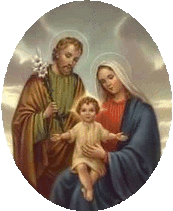born into a family with parents: Our Blessed Mother Mary, and a father, St. Joseph. There’s no escaping the message that families are
intended to be holy places for children to grow and prepare to enter the
world.
“Honor your mother and father that your days may be long in the land which the
Lord your God gives you.” (Ex 20:12).
It’s actually the only commandment with a promise attached to it.
become obvious to us now that we are parents.
Too bad we did not esteem it when we were children ourselves. I
sometimes wonder if some of the challenges I’ve faced as a parent are connected
to my mother’s words coming true: “I
hope that one day you have a child just like you.”
mind.” But with the experience of
motherhood, I sometimes wonder if it’s payback time now. If the adage, “What goes around, comes
around,” has any validity, then I certainly never deserved compliant, docile
children. There are no do-overs on
childhood, so repentance and prayers and some make-up behavior if our parents
are still alive, is the best we can do now.
Mary and Joseph, “He was obedient to them. (Luke 2-51). Yes, God was obedient to two humans,
creatures that he created and was infinitely more powerful than. But these were his parents, so he obeyed them
as an example to us.
family but it also puts an incredible responsibility on our shoulders as parents. The reason our children are suppose to be
obedient to us is because we are taking the place of God here on earth. Those are big shoes to fill. We are not God, but we need to be as close
as we can when it comes to our behaviors as a parent because we are suppose to
be a reflection of Our Loving Father in the lives of our children.
 According to the Catholic Catechism, the
According to the Catholic Catechism, theFourth Commandment, “shows us the order of charity. God has willed that, after him, we should
honor our parents to whom we owe life and who have handed on to us the
knowledge of God. We are obliged to
honor and respect all those whom God, for our good, has vested with his
authority.” (2197)
with God but to respect all those whom God has vested with his authority. As
adults, we must still respect our parents, although we are no longer in a
position where we must be obedient to them.
Also, the fact is that all parents are not religious or providing good
examples. Now that we are the parent, it is up to us to be the example to our
own children and in some cases to our parents.
There may even be resistance. Although most usually imagine it’s the
grandparents urging the parents and grandchildren towards church, it does also
happen that adult children, not raised with religion, are resisted and even
persecuted for following their religious values. Still, we must respect our parents, even if
it means disagreeing with them. By
praying for them and responding always out of love, we show them respect even
when there is dissension.
when it comes obedience. To honor and
respect those vested with God’s authority means that we must obey the authority
of God in our lives. Just as our children are not honoring us when they disobey
us, so too, we are not honoring God when we disobey him. Remember, Jesus told us that he would not
leave us orphans. He left us his Church
to guide us. God’s fatherly and motherly
care comes to us through the guidance of his church and all its teachings.
down a path you had not expected or wanted to go, it might be that you are
finding a place to start the spiritual healing in your family. You cannot stand in authority over your
children and demand obedience from them and then turn around and refuse
obedience to our Heavenly Father.
in positive terms. We are not being told
not to do something. Instead, we
are given a duty to fulfill. The
subsequent commandments follow concerning life, marriage, speech and earthly
goods. The order of the commandments
goes from relating directly to God in the first three–to hold God above all
things, not to take his name in vain, and keep his day holy. Then, the next step is to the authority of
parents before proceeding to commandments that follow the rest of our daily
encounters.
Fourth Commandment is addressed expressly to children in their relationship to
their father and mother, because this relationship is the most universal. It likewise concerns the ties of kinship
between members of the extended family.
It requires honor, affection, and gratitude toward elders and
ancestors. Finally, it extends to the
duties of pupils to teachers, employees to employers, subordinates to leaders,
citizens to their country and to those who administer and govern it.
the duties of parents, instructors, teachers, leaders, magistrates, those who
govern, all who exercise authority over others or over a community of persons.
(2199)
the hook, even after our parents are deceased.
In a way, it can make us feel like we are still children, always needing
to obey. But that is a good thing. “Truly
I say to you, unless you are converted and become like children, you will not
enter the kingdom of heaven. (Matt 18:3).










I like it! Good work. As a priest and teacher for CCD class I'm amazed at the lack of respect that parents-not kids-but parents have towards their faith!!! Something is seriously wrong here. Very few come to Mass on Sundays. And to get them to go is like pulling teeth. We require all the kids who are receiving a sacrament to attend Sunday Mass. We have a little card system to keep track. There are some parents who drop their kids off at Mass and then scoot out when the priests aren’t looking and go back home! Many parents are forgetting their roles as parents, as guides and teachers in the domestic church. And the common response is, "Well, I want to be their friend not their parent." Many of our kids want to come to Mass. They like it. But many parents have become so terribly slothful they’re forgetting who they are. And then they wonder why they’re not receiving the graces and blessings from God, why they are so unhappy in life. Oh well, we just keep praying a moving right along. Maybe the next generation will get it.
This comment has been removed by the author.
Thanks for your comment Big Kahuna. Boy, do I hear you. I've taught religious ed. classes on and off for 10 years. One year, I had a 5th grader who loved class. He told me when he was a boy, he used to play "Mass" on his picnic table and use Lifesavers for pretend hosts. He kept asking about being an altar server and would stare at the sheet inviting kids to become one. He never did sign up though. I discovered later it was because his parents often did not go to Mass. He was afraid he would not be able to get to Mass. I pray for the entire family of my students, send home letters about what we are doing in class and enroll families in Masses at Christmas. If the parents don't obey the Church, they teach their children to reject the Church.
Love this topic, Patti! Thanks for the post. Your insight is invaluable. In my almost 16 years as a Catholic educator, I've seen the mindset of many parents drift further and further towards a general lack of participation in the development of their children's faith. In many cases, parents feel overwhelmed, inadequate to the task, or simply uninterested. My hope is to make parents more aware both of the importance of their own role, and of simple, everyday ways to "grow" faith-filled kids. Been blogging on this for over a year at http://www.growingfaithfilledkids.blogspot.com.
Wonderful to hear of your work. I will check out ykour blog too. I keep thinking that at least the parents are bringing them for instruction. It's a start, but so much more to do. May God bless you in your efforts.
The June 2012 Magnificat magazine had a wonderful piece of art on the cover: George Desvallieres's "Sacred Heart, Protector of Families".
I wish I could find a larger version:
http://www.georgedesvallieres.co /fiche1924_scfamilles_en.html
The analysis from the magazine's art historian, Pierre-Marie Dumont: "…an icon of the virtues of family life. Founded upon the unity of the spouses in prayer…the family thrives as fruitful vine shoots grafted onto the true Vine. Christ thus gathers the children under the protection of his mantle of mercy. In his halo, the new Commandment, AIMER, is the family's rule of life. Beside him, the cross, planted in the earth and springing up to heaven, attests that to love as Jesus has loved us means: to give our life to those we love. And now the heart that has so loved the world sheds its divine light upon the three children in prayer, calling them to become the light of the world."
Man intuits that we would simply cease to exist if God ceased to will our existence from moment to moment. Thus His grace flows to the wheat and tares alike in a baseline, existential way. But how much more so does it flow to the little shoots of green wheat who seek his face, who seek to know him, love him, and serve him, and in so doing also ask — ask — for his blessings. He lavishes love and grace upon those who expend even one iota of faith's effort to ask for anything.
But how many families look upward in our unchurched brave new world?
"Behold the Heart which has so loved men that it has spared nothing, even to exhausting and consuming Itself, in order to testify Its love; and in return, I receive from the greater part only ingratitude, by their irreverence and sacrilege, and by the coldness and contempt they have for Me in this Sacrament of Love."
As a religious ed teacher a few years ago I ran into the same problem. Later I heard of a teacher in the same program who solved the problem. He insisted that if the parents wanted their children to come to CCD, then they must attend the classes with their children. This not only solved the discipline problem completely, but it brought many parents up to speed with the faith.
That is a great idea. We have some churches in our diocese that requires parents attend sessions for them. It's a great idea although I'm sure some end up going to other churches that don't require it or don't go at all. IT's definitely the mission field.